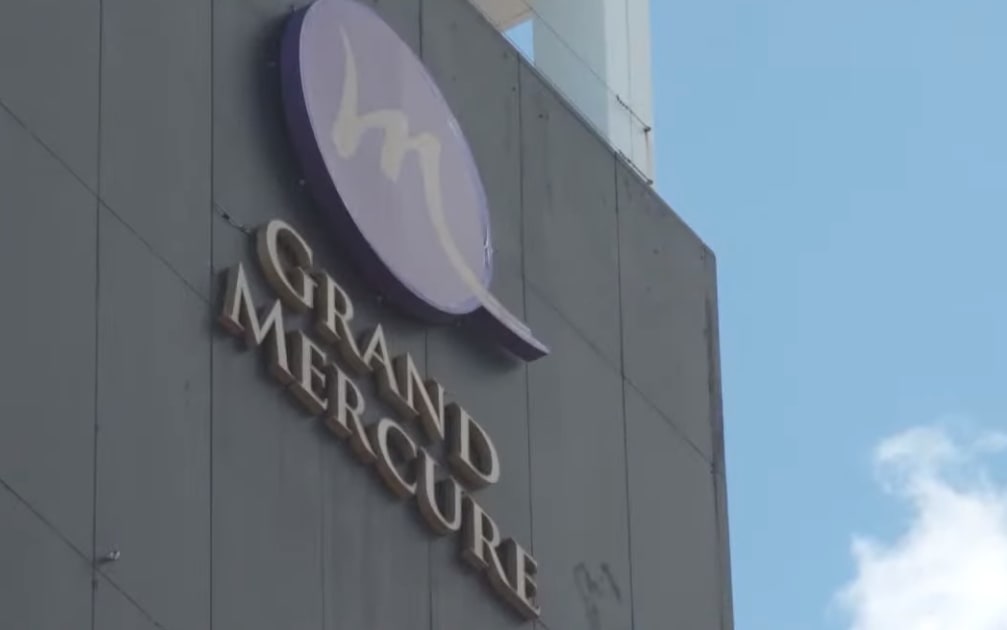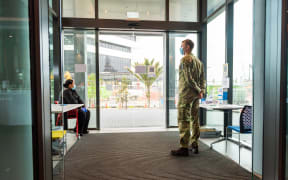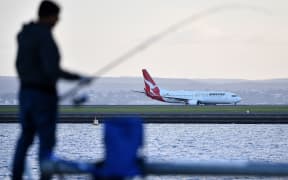Fresh questions are being asked over management at managed isolation (MIQ) hotels following news of a possible transmission at an Auckland facility.

Officials are asking 250 people who were staying at the Grand Mercure at the same time as the two recent cases to isolate at home and get tested. Photo: RNZ
Genome sequencing has shown a link between two returnees who stayed on different floors at the Grand Mercure. They arrived on separate flights, two days apart.
Epidemiologist Nick Wilson said it was clear people inside MIQ hotels couldn't safely move around and should stay in their rooms for their entire two-week stay.
Joanna Alpe, who was in isolation at the Rydges Hotel in central Auckland earlier this month, said even just knowing she could go for a walk significantly improved how she felt.
"I certainly did feel a lift when I knew I had an appointment to go outside," Alpe said.
However, people had to weigh up the risks of infection every time they left their room, she said.
"Having been in the UK through some of the darkest times, we just got used to living with calculated risks, you keep isolated and obey the rules but it's all around you.
"You just have to come to terms with that baseline calculated risk."
Officials are asking 250 people who were staying at the Grand Mercure at the same time as the two recent cases to isolate at home and get tested.
University of Otago public health expert Nick Wilson suggested MIQ facilities were too lax.
"We really need to seriously look at the Australian model where everyone in MIQ stays in their room for the full 14 days. Hopefully they are supplied with exercise equipment and all that but it really is a safer approach," Professor Wilson said.
An extra level of safety will be crucial as Aotearoa prepares to open a trans-Tasman bubble.
"If we really want that to work well with no border failures occurring that would disrupt that travel, it's time the government looks at tightening up the processes with its MIQ system," Wilson said.
He acknowledged while it was an extra ask for those in MIQ facilities, that was a sacrifice people must take in order to protect the rest of the country from more infectious variants of the virus.
Another returnee, Jody Brettkelly, stayed at the Four Points by Sheraton in Auckland after coming back from California in January.
She said despite all the precautions already in place, she would have felt much safer if there was a policy which didn't allow people out.
"It's a real worry getting on the elevator to get the Covid test. After living in the States, where you're so aware of that all the time - even on hikes you have to wear a mask - you're really hyper aware," Brettkelly said.
She said her family were so concerned about potentially catching Covid-19 in their final few days in MIQ, they opted to get a test once arriving home.
"Really when we thought back, we felt we should have gone into individual isolation here and stayed in our house … because there is a risk."
Covid-19 Response Minister Chris Hipkins said he was taking the possibility of transmission within the Grand Mercure very seriously and was working hard to ascertain the route of infection between the cases.
There was a low risk of community transmission, Hipkins said.
NZ taking in more travellers than Australia per capita - epidemiologist
Checkpoint revealed yesterday that a guest who was bussed to an exercise area away from the hotel with another returnee whose positive test result was found while out walking, but then went back on the same bus.
University of Otago epidemiologist Michael Baker said it was another example of problems with MIQ facilities.
He told First Up a number of things had gone wrong so far.
"We've had 13 identified border failures that have resulted in community cases. And at least six internal MIQ failures where there's been transmission inside these facilities. Most of those who test positive on day 12 would have been infected inside the MIQ rather than a long incubation period."
He said it was imperative the government look at how many infected people arrived.
"On a per-capita basis, New Zealand is taking in five times more travellers from overseas than Australia."
It was common practice overseas for those in managed isolation to not leave their rooms for the full 14-day period, he said.
Baker could not say if the travel bubble with Australia would inevitably lead to a lockdown.
"We've got vaccines on the horizon. Things are looking positive for the longer-term control of the pandemic."






